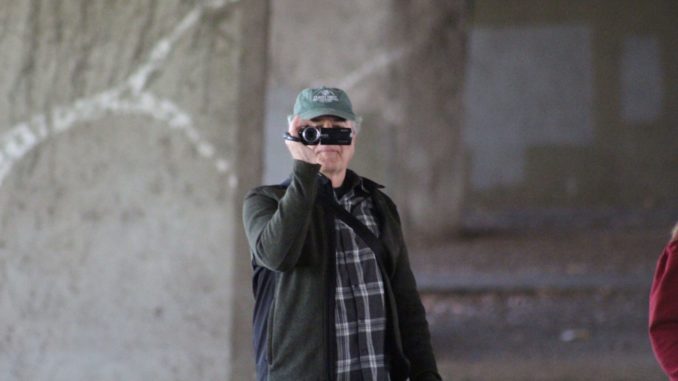
As Chico police officers and city staff readied to evict homeless campers from The Triangle on Feb. 4, City Councilman Scott Huber said he couldn’t just stand by and watch as people’s belongings were bulldozed.
“I felt like the humane thing to do was to help people organize their things and move them, so that they weren’t being thrown away in the middle of winter when it was forecast for more rain,” Huber said March 2. “I had a pickup truck and just felt called to do it … I didn’t give too much thought to the legality of it.”
The notion that Huber and other helpers could be committing some sort of crime was not lost on Chico attorney Rob Berry, however. Berry—who runs the online “safe, clean and beautiful community” group Chico First—wrote a letter to the City Council and staff the following day accusing Huber and others of criminal conspiracy for helping campers move from one illegal encampment to another.
Undeterred, Huber and homeless advocate Charles Withuhn helped campers relocate from a property on Boucher Street Feb. 16 when camps there were razed by the city. Berry was on hand to film the enforcement action and was moved to write another letter, dated Feb. 22. In that letter—addressed to City Manager Mark Orme, Police Chief Matt Madden and recently terminated City Attorney Andrew Jared—Berry reasserts his belief that advocates helping campers move are violating several sections of the city’s Muncipal Code.
“It is my intention to engage in and encourage the exercise of Citizen Arrest rights against any parties observed to violate these laws of California and Ordinances of the City of Chico,” the letter reads. In numerous online postings, Berry specifically names Huber and criticizes his actions, as a council member, and those of Withuhn, as a member of the Chico Housing Action Team. (Huber and Withuhn both contend they were there of their own volition and not representing any organization.)
Berry’s threats—as well as the March 2 arrest, by actual police, of a protester outside of the last Chico City Council meeting—are signs that the public conflict over how Chico handles the issue of homelessness is intensifying as the encampment sweeps continue. Additionally, Chico police barred reporters, protesters and helpers from entering the Boucher Street property as it was cleared of campers; one camper was finally issued a citation for refusing to vacate an area targeted by sweeps; and at least two legal challenges to the encampment sweeps are reportedly being prepared.
Crossing lines
Huber and other homeless advocates aren’t taking Berry’s words lightly. Since the letter was posted to social media Feb. 27, several people have accused Berry of threatening to take the law into his own hands and equated the letter to a call for vigilante action against homeless advocates and protesters who continue to show up for the city’s ongoing encampment sweeps.
Huber said he’s been very transparent about his involvement in helping campers move and that he “doesn’t necessarily contest that where I dropped their things off may in some context not have been legal.” He also said he’s willing to accept legitimate penalties incurred for his act of civil disobedience.
“I wouldn’t have a problem with a police officer coming up to me and citing me and saying, ‘You’ve done something illegal and I need to write you a citation.’
“That’s OK with me, I’m willing to take that risk. What I’m not willing to take is having a private citizen, who’s known to be overly zealous and antagonistic towards various community members, come up to me and act as though he is law enforcement.”
Huber said one of his concerns about Berry engaging in arrests is that he has openly stated on social media that he has a permit to carry a concealed weapon. “What happens when I say, ‘I don’t recognize your authority to hand me that piece of paper.’ At that point does he whip his gun out and say, ‘I’m the law because the law’s not here’? I acknowledge that’s far-fetched, but what about other people who feel empowered by Mr. Berry to do that? It just seems like it can get really ugly really quickly.”
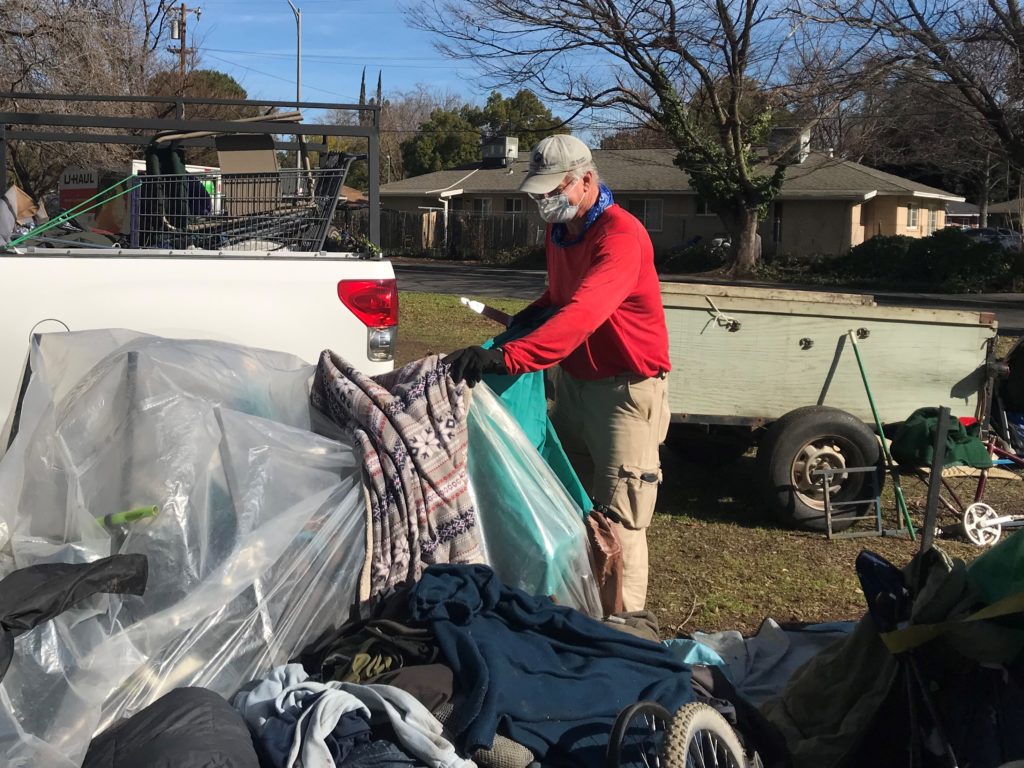
Angela McLaughlin, a homeless advocate and founder of community group Stand Up For Chico, expressed concerns about the letter contributing to rising tensions: “Many of us have been worried for a long time about vigilante activity because of the ugliness of the rhetoric. … We’ve long been concerned there would be an escalation to violence.”
Huber characterized the threats as a “power grab” by Berry: “It’s not so much about homelessness and evictions … he’s essentially telling the police chief that he is not doing his job, so Mr. Berry is going to do it for him. It needs to be stated unambiguously and publicly that the police department and city management does not endorse private citizens taking the law into their own hands.”
McLaughlin echoed that sentiment: “The police chief, right off the bat, should have said,‘Thank you, but no thank you, this is the role of law enforcement,’” she said.
Chief Matt Madden did finally issue a press release regarding citizen’s arrests on March 2. It doesn’t mention Berry or his letter, but does caution people about the risk of attempting citizen’s arrests: “If a Peace Officer determines the citizen has not provided the proper evidence to support an arrest, the Peace Officer will decline the arrest. The citizen making the arrest takes on the civil liability of making potential false arrests and could be held criminally responsible for rights violations, such as the Fourth Amendment of the United States Constitution. Due to the potentially high level of danger to the public, we encourage citizens to contact the Chico Police Department and allow our staff to investigate crimes in progress.”
Furthermore, police on the ground at the sweeps have allowed people to help campers move. Though press, protesters and helpers were initially kept out of the area during the eviction on Boucher Street, officers eventually allowed Huber and Withuhn to drive in with trucks and lend assistance. During the March 2 sweep of encampments in Lower Bidwell Park from Highway 99 to Madrone Avenue, Target Team lead Sgt. Paul Ratto personally opened the gate at Peterson Memorial Drive—which was locked for the sweeps—to allow advocates Kelli Johnson and Harrison Pratt access to help move campers.
“I’ll allow people in to help, but it has to be done in a safe manner away from any equipment,” said Ratto. He refused to comment on Berry’s stated intent to make arrests.
Bungle on Boucher
The Feb. 16 sweep on a Boucher Street property adjacent to Little Chico Creek raised several legal questions in itself.
To begin with, helpers assisted some campers to the area because homeless advocates identified the property as city-owned land not covered by the Dec. 8 ordinance that criminalized the breaking of rules—i.e. camping—in city parks and specific areas where homeless encampments sprang up. The previous City Council had relaxed camping restrictions last spring, in keeping with the U.S. Centers for Disease Control and Prevention’s guidelines for limiting the spread of COVID-19 among homeless populations. Asked about this, Ratto said the city’s waterways are also covered by the ordinance.
Also of note, police officers held observers—including the press—outside of the area, prompting a complaint from local journalists (see Second & Flume, page 4) for interfering with the press’ First Amendment rights.
The city put out a press release the next day justifying the action by saying the encampment qualified as a work area. “There was no concerted effort to disallow any member of the media or public to rightfully enter any location where they can legally enter, and the media is always provided a safe vantage point from which to conduct their reporting,” it reads.
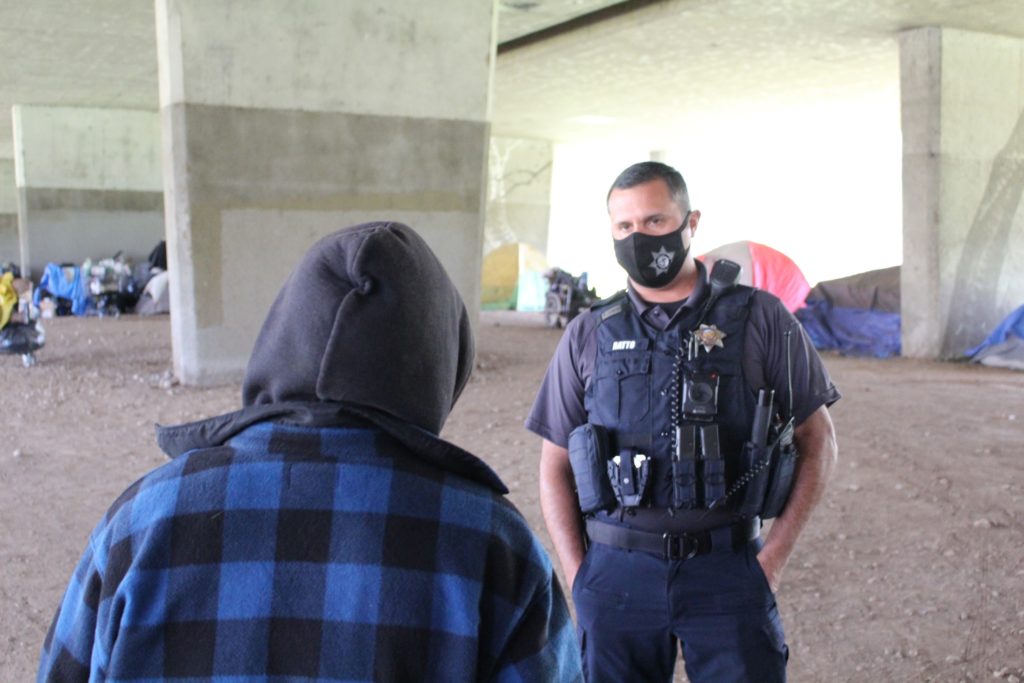
Finally, police have been strategic in their efforts to achieve “voluntary compliance” while moving campers, and none of the sweeps prior to Boucher Street resulted in citations or arrests. That streak was broken when Larry Halstead, an activist and unhoused Camp Fire survivor with Stage 4 cancer, was ticketed for “camping in a regulated area” when he refused to move his belongings from the Boucher Street property.
“I’m looking forward to taking the fight to the courts,” Halstead said March 6.
Some advocates believe such citations are a boon to legal challenges being mounted against the city, of which there are two in the works. Attorney Kelli Johnson said last week she intends to file paperwork against the city soon. Legal Services of Northern California (LSNC) is also reportedly working up a case. As of March 2, LSNC’s Cory Turner said he was unable to comment about that legal challenge.
Well connected
Interviewed by phone March 5, Berry said the citizen’s arrest letter was never meant to be seen by the public, which is why he sent it to the city manager, city attorney and police chief rather than the City Council. He said Huber shared it on social media and engaged in media interviews, and is therefore responsible if the letter moves anyone to take action and attempt to make an arrest.
“The intent [of the letter] was to facilitate a conversation between the management/leadership of Chico for them to internally decide how they wanted to handle the fact that one of their City Council members was out there violating the laws they’re sworn to uphold.
“That was [Huber’s] decision to publish the letter and to handle it that way, so any encouragement that comes from the letter, I suppose, would be on Scott.”
McLaughlin expressed concerns about what influence Berry might have with the City Council and the police department, and said those connections potentially allow him better access to officials than the average citizen. She said Berry’s endorsement and clout helped elect the four conservatives who won City Council seats in last year’s election, that Berry was a member of former Mayor Ann Schwab’s Policing Review Ad-Hoc Committee, and he served on the Police Community Advisory Board (PCAB) for the past few years.
The PCAB consists of a dozen community members appointed by the police chief and is aimed at facilitating better communication between the police department and the community. Other members include conservative Vice Mayor Kasey Reynolds and Julia Yarbough, a former Action News Now reporter who previously worked as the Press Information Officer for the Chico Police Department. Crystal Peppas, administrative assistant to Madden, said that the board has been in a state of flux since Madden took the helm of the CPD last August and will likely be reformed soon with a new mission statement and objectives.
Jovanni Tricerri, the PCAB’s chairperson, confirmed March 5 that Berry is no longer part of that board. He said Berry left the board within the last month by “mutual agreement” between Berry and Chief Madden. Berry didn’t comment further on his role with the PCAB, referring the CN&R to Madden and saying “I don’t speak for the CPD.” Madden was unavailable for comment as of press time.
Berry said he’s unsure if he will attend future sweeps with the intent of making citizen’s arrests. He also refused to comment on whether he carries a weapon: “Nobody that has a [concealed weapons] permit or carries a weapon is supposed to tell anyone … I’m not allowed to under the system, so, ‘No comment,’” he said.
The real deal
Questions of citizen’s arrests aside, two protesters met with real consequences for acts of civil disobedience last week.
Robert Van Fleet was arrested outside of City Council Chambers minutes before the council’s meeting was scheduled to begin at 6 p.m., on March 2. Chris Nelson received a citation. Both are charged with resisting or obstructing a police officer.
The charges stem from the pair’s participation in a protest at the council meeting aimed at the city’s ongoing homeless encampment sweeps under the direction of the conservative-majority council. It was also intended to recognize the 18 members of the homeless community who are known to have died in the last year.
The protest included a “die-in,” in which about a dozen people laid on the ground with blankets and pillows. Nelson and Van Fleet laid at the bottom of the steps between Council Chambers and the city’s Municipal Building. Police asked them to move, but the pair held fast.
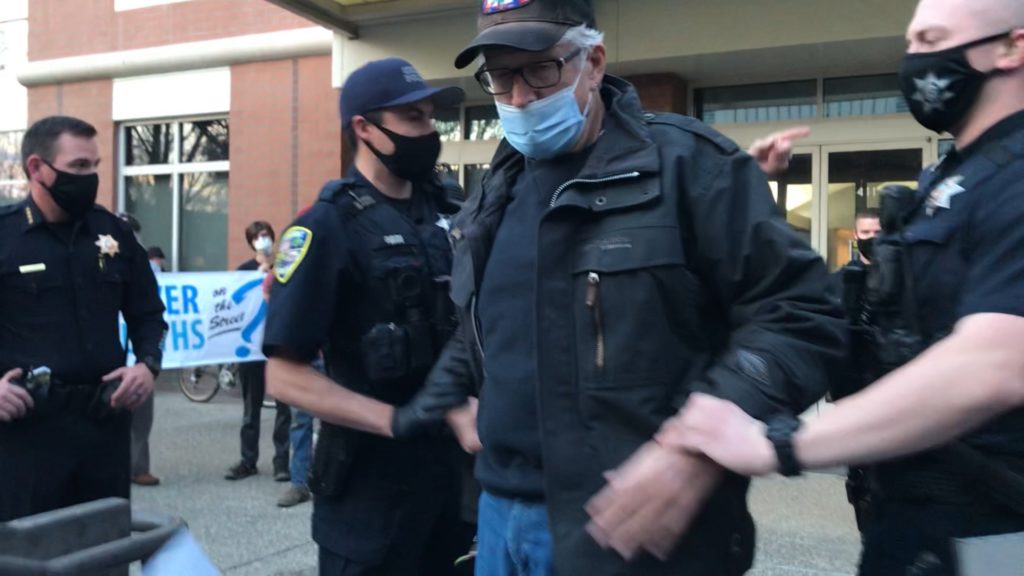
Nelson was spared arrest when she agreed to move by 6 p.m., and she reported to Facebook that two officers delivered the citation to her home the following day. Van Fleet was arrested, handcuffed and taken to the Chico Police Station, where he was released within an hour.
The protest began at 5 p.m. and attracted more than 50 participants. A cadre of nine officers—including Madden—arrived at 5:39 p.m.
Police trying to move Van Fleet said he was blocking entrance to the steps, but several protesters walked through without issue to demonstrate that wasn’t the case. Councilman Sean Morgan, escorted by Madden, also passed by Van Fleet unobstructed.
Interviewed the following day, Van Fleet said he made a conscious decision to get arrested while lying on the concrete.
“I think those of us who are trying to make a difference need to step up our game,” he said. “I think we need to be a little bit more assertive and aggressive. Civil disobedience, which I’ve been involved in with other issues, is often where real solutions come from. It’s not usually government or other agencies that make significant change, its people in the streets willing to make some sacrifice to stand up for what they think is right and what they think is wrong.”
Van Fleet’s final charges don’t match with what officers on the scene told CN&R was the cause of the arrest. CPD Lt. Mike Williams—who identified himself as the lead officer present that evening—said Van Fleet was arrested for “a city ordinance violation, then [Van Fleet] failed to identify himself.”
When Williams was unable to recall the specific code violation, another officer cited section 9.44.018 of the city’s Municipal Code, “obstructing the entrance of a building.” That violation is part of the offenses against public property ordinance, which the city adopted in 2015 and critics say is designed to criminalize homelessness.
As all this conflict has played out, there still have been no new emergency shelter options provided by the city—and among other local agencies, only the 20 or so beds opened by Safe Space Winter Shelter starting Feb. 7 have been added since the sweeps began. Several campers evicted from Lower Bidwell Park last week reported they’d contacted the Torres Community Shelter and were told there is a significant waiting list.
The last two remaining large encampments—at Windchime Park on Humboldt Avenue and the Comanche Creek Greenway—have grown exponentially as campers are moved from other areas. With the city seeming to hold a steady course on clearing camps, more 72-hour eviction notices and more conflict seem imminent.

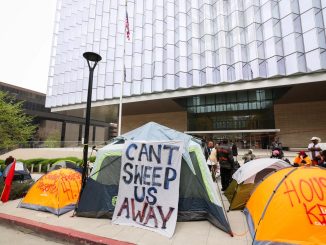

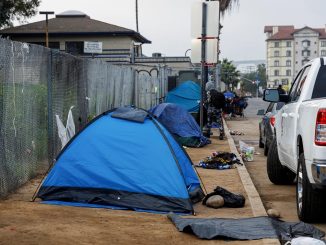
We’ll open the door for someone carrying a tray, And wish them, “Have a good day.” If someone’s carrying their everything, their very sight is a fright. For them all we have is the “bum’s rush.” How sad to miss the opportunity, to acknowledge and accept their presence, and know their gift of gratitude, and talents undiscovered, when they’re locked in survival mode.